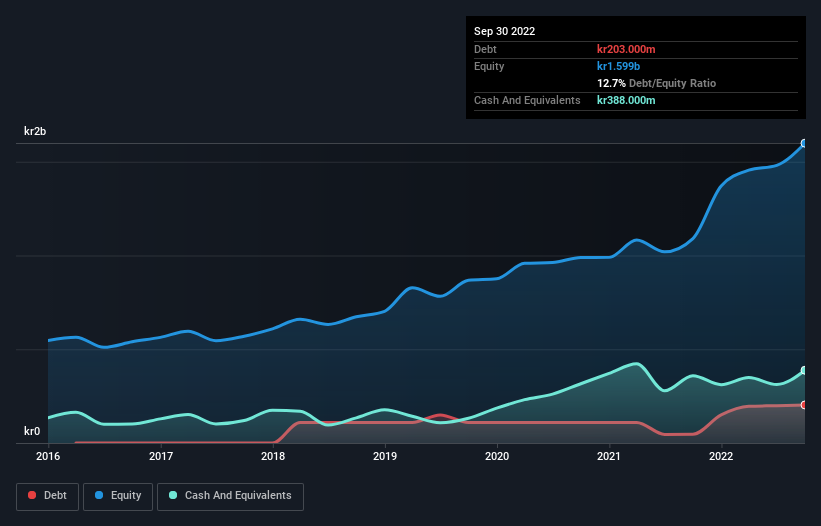Some say volatility, rather than debt, is the best way to think about risk as an investor, but Warren Buffett famously said that 'Volatility is far from synonymous with risk.' When we think about how risky a company is, we always like to look at its use of debt, since debt overload can lead to ruin. As with many other companies Biotage AB (publ) (STO:BIOT) makes use of debt. But the real question is whether this debt is making the company risky.
Why Does Debt Bring Risk?
Debt assists a business until the business has trouble paying it off, either with new capital or with free cash flow. In the worst case scenario, a company can go bankrupt if it cannot pay its creditors. While that is not too common, we often do see indebted companies permanently diluting shareholders because lenders force them to raise capital at a distressed price. Of course, plenty of companies use debt to fund growth, without any negative consequences. When we examine debt levels, we first consider both cash and debt levels, together.
Check out the opportunities and risks within the SE Life Sciences industry.
What Is Biotage's Net Debt?
The image below, which you can click on for greater detail, shows that at September 2022 Biotage had debt of kr203.0m, up from kr47.0m in one year. However, its balance sheet shows it holds kr388.0m in cash, so it actually has kr185.0m net cash.

A Look At Biotage's Liabilities
According to the last reported balance sheet, Biotage had liabilities of kr402.0m due within 12 months, and liabilities of kr305.0m due beyond 12 months. On the other hand, it had cash of kr388.0m and kr314.0m worth of receivables due within a year. So these liquid assets roughly match the total liabilities.
Having regard to Biotage's size, it seems that its liquid assets are well balanced with its total liabilities. So while it's hard to imagine that the kr12.7b company is struggling for cash, we still think it's worth monitoring its balance sheet. Despite its noteworthy liabilities, Biotage boasts net cash, so it's fair to say it does not have a heavy debt load!
In addition to that, we're happy to report that Biotage has boosted its EBIT by 39%, thus reducing the spectre of future debt repayments. There's no doubt that we learn most about debt from the balance sheet. But it is future earnings, more than anything, that will determine Biotage's ability to maintain a healthy balance sheet going forward. So if you want to see what the professionals think, you might find this free report on analyst profit forecasts to be interesting.
Finally, a business needs free cash flow to pay off debt; accounting profits just don't cut it. While Biotage has net cash on its balance sheet, it's still worth taking a look at its ability to convert earnings before interest and tax (EBIT) to free cash flow, to help us understand how quickly it is building (or eroding) that cash balance. Happily for any shareholders, Biotage actually produced more free cash flow than EBIT over the last three years. There's nothing better than incoming cash when it comes to staying in your lenders' good graces.
Summing Up
While it is always sensible to look at a company's total liabilities, it is very reassuring that Biotage has kr185.0m in net cash. The cherry on top was that in converted 100% of that EBIT to free cash flow, bringing in kr285m. So is Biotage's debt a risk? It doesn't seem so to us. Above most other metrics, we think its important to track how fast earnings per share is growing, if at all. If you've also come to that realization, you're in luck, because today you can view this interactive graph of Biotage's earnings per share history for free.
If, after all that, you're more interested in a fast growing company with a rock-solid balance sheet, then check out our list of net cash growth stocks without delay.
Valuation is complex, but we're here to simplify it.
Discover if Biotage might be undervalued or overvalued with our detailed analysis, featuring fair value estimates, potential risks, dividends, insider trades, and its financial condition.
Access Free AnalysisHave feedback on this article? Concerned about the content? Get in touch with us directly. Alternatively, email editorial-team (at) simplywallst.com.
This article by Simply Wall St is general in nature. We provide commentary based on historical data and analyst forecasts only using an unbiased methodology and our articles are not intended to be financial advice. It does not constitute a recommendation to buy or sell any stock, and does not take account of your objectives, or your financial situation. We aim to bring you long-term focused analysis driven by fundamental data. Note that our analysis may not factor in the latest price-sensitive company announcements or qualitative material. Simply Wall St has no position in any stocks mentioned.
About OM:BIOT
Biotage
Provides solutions and products in the areas of drug discovery and development, analytical testing, and water and environmental testing.
Flawless balance sheet with proven track record.
Market Insights
Community Narratives



